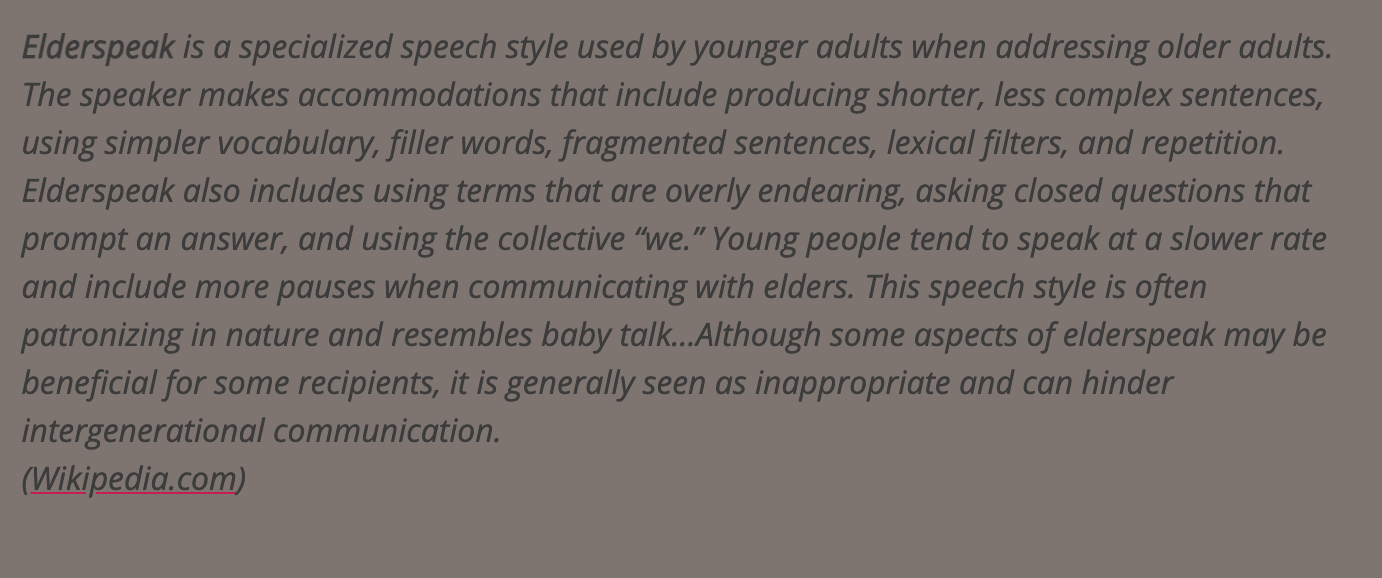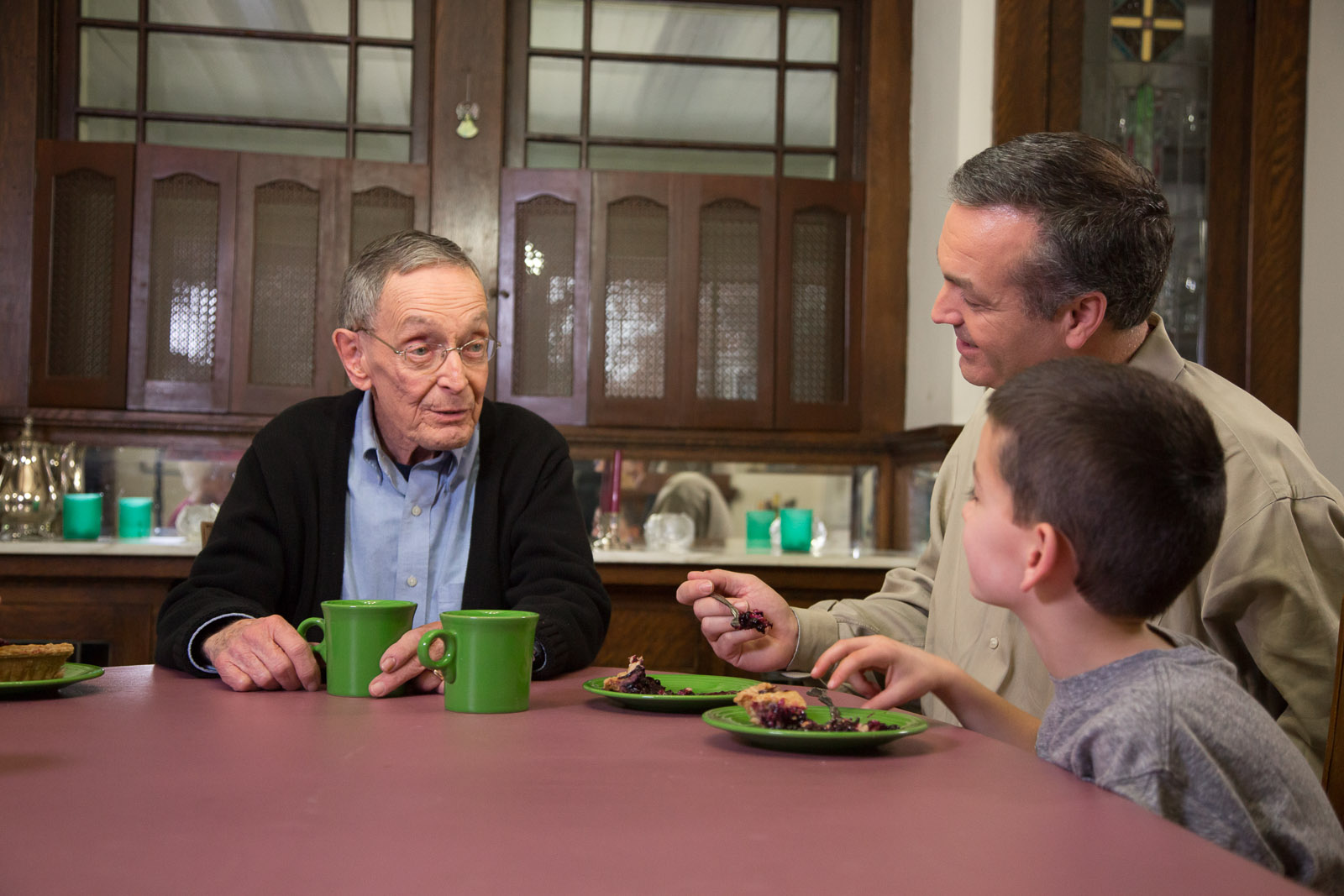In our November blog post, "Having the (Healthcare Decision) Talk,” we addressed the difficulties many people have in discussing important issues with their aging loved ones, things like healthcare decisions and end-of-life wishes. While it’s certainly true that those are difficult topics to discuss with our loved ones, how we talk to them about anything—whether it’s a weighty, emotionally-fraught decision, or simply a chat about what to have for lunch that day—matters just as much as the topic at hand.
Think about the many individuals you have conversations with every day: young children, the barista at your local coffee shop, your boss, your child’s teacher, your Uber driver. Do you address them all with the same set of vocabulary, the same tone of voice, the same body language or eye contact? Probably not; that’s one of the truly remarkable things about human communication: our ability to shift (hopefully!) seamlessly our body language, tone, and word choices from person to person to reflect the dynamics of the individual with whom we are communicating. More often than not, we don’t even realize we’re doing so. (My children are fond of telling me that when I am with my two sisters, my voice rises two full octaves and at least ten decibels, but that’s mostly because we’re trying to annoy them.)
That seamless shifting in communication style is critical for clarity—imagine trying to explain an impending flu shot to a two-year-old the same way you would explain it to your spouse. To a spouse, you might simply say, “Roll up your sleeve.” Your spouse’s life experiences, ability to make inferences, etc., allow for tremendous clarity with that minimal statement. But just imagine the results of trying that same scenario with a two-year-old!
Unfortunately, sometimes, and this is particularly true with the elderly, many people find themselves practicing a communication shift that is the reverse of this scenario—instead of treating our loved ones as mature, independent adults with minds and interests and experiences of their own, we begin practicing what has come to be known as “elderspeak”:
Ah, the dreaded elderspeak. It’s an easy communication trap to fall into, and we often fall into it without realizing we’re doing so: “How are we feeling today, sweetie?” “Wow, your tummy must feel better now after eating all that yummy pudding!” How on earth can anyone expect to have a serious conversation about anything under those conditions, let alone about important issues such as healthcare or end-of-life concerns?
Thankfully, there are some easy things you can do to keep yourself from slipping into elderspeak, first and foremost of which is to begin monitoring yourself during conversations with your loved one. Here are some other tips:
- Don’t treat your loved ones differently just because they’re old. Avoid making assumptions about their cognitive levels, hearing ability, or capacity to remember things, and be sure to speak directly to him or her, with good eye contact and clear (but not shouty!) enunciation. And, unless you’re from the deep South and address literally everyone as “Sweetie” or “Darlin’,” don’t start tossing those inflated terms of endearment around—for some elderly people, those are about as endearing as patronizing little stink bombs.
- Try to adapt to their physical changes. As we age, we become more sensitive to things like background noise, room temperature, crowds, etc. Don’t chalk those changes up to “she’s just old.” Instead, be aware that the reason Grandma didn’t catch what you said may be because she wasn’t able to see your mouth, and thus couldn’t “guess” a missed word here and there by reading your lips; or perhaps your explanation was a bit long and rambling and she missed part of it. Slow down, be patient, don’t patronize.
- Remember that they are people, too, just like you. Lifehacker.com offers a great suggestion to help you better understand this point:
 That last tip is probably the most important one: imagine what it feels like to be the same vibrant, vivacious, engaging, competent, feisty, smart, independent, and lively person you’ve always been on the inside, but then that wonderful person is suddenly invisible to much of the world, simply because all the world sees is “old.” That is how our senior loved ones feel when we stop communicating with them as people and slip into communicating with them as “old people.” It is an easy habit to fall into, unfortunately, but happily, with a little bit of self-monitoring and some patience, it’s an even easier habit to correct.
That last tip is probably the most important one: imagine what it feels like to be the same vibrant, vivacious, engaging, competent, feisty, smart, independent, and lively person you’ve always been on the inside, but then that wonderful person is suddenly invisible to much of the world, simply because all the world sees is “old.” That is how our senior loved ones feel when we stop communicating with them as people and slip into communicating with them as “old people.” It is an easy habit to fall into, unfortunately, but happily, with a little bit of self-monitoring and some patience, it’s an even easier habit to correct.
More information & local/additional resources:
Home Instead Senior Care of Montgomery County, MD
Caregiver Resource Center, Holy Cross Resource Center; Sister Kathleen Weber
Maryland Senior Resource Network
MD Department of Aging
How to Talk to Seniors: Communication Tips
Sources:
https://en.wikipedia.org/wiki/Elderspeak
https://www.aafp.org/fpm/2006/0900/p73.html
https://lifehacker.com/the-mistakes-we-make-communicating-with-elders-and-how-1575782036
https://www.wikihow.com/Communicate-With-Older-Adults



